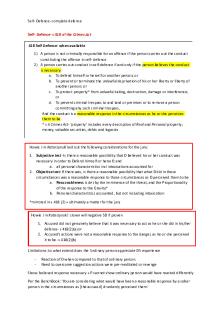Householders - Self Defence Lecture Notes PDF

| Title | Householders - Self Defence Lecture Notes |
|---|---|
| Author | Andra Oprea |
| Course | Criminal Law |
| Institution | University of Nottingham |
| Pages | 1 |
| File Size | 46.9 KB |
| File Type | |
| Total Downloads | 51 |
| Total Views | 139 |
Summary
Lecture notes covering the topic of self defence: householder cases where greater force can be used....
Description
Householders Lecture Notes The exception was introduced by S.76(5A) (added by Crime and Courts Act 2013, S.43) to allow greater latitude in ‘householder’ cases following renewed public concern about repelling burglars. The test is still ‘reasonable force’ but D may escape conviction despite using force that is disproportionate. - S.76(8A) applies where D is not a trespasser, but he is in a dwelling and he uses force against somebody who is/believes to be a trespasser. - Cheeseman [2019]: The defendant who was a soldier, living in forces’ accommodation, used force against the victim, who he had originally invited into his room, but told V to leave when V began to do damage to V’s property. V became a trespasser at that point. Critics question whether there was any need for a special rule for householder cases in light of CJIA 2008, S.76(7). - Defendants always had a little bit more latitude than what the proportionality test, on its face, suggests. - Even before, the law went quite a long way to protect the householder wanting to protect himself from an unexpected burglar. ECHR Art 2: Art 2(right to life) requires states to provide a proper framework to deter/punish offences vs the person. - In Collins [2016] the householder provisions were challenged but held to be Art 2 compliant: o Householders are liable for the full range of OAP offences. Self-defence allows only ‘reasonable force’ in all cases. o S.76(5A) allows a ‘discretionary area of judgement’ to find force that is disproportionate (but not grossly so) to be reasonable. D cannot go ‘completely over the top’. The change is a ‘minor qualification’ which ‘adds emphasis’ to S.76(7) and links to the Art 8 rights to protection of the home. Perhaps instead of an amendment to householder cases, Parliament should have focused on excessive force as a partial defence to murder. - Clegg [1995]: ‘In murder there is no half-way house. There is no rule that a defendant who has used a greater degree of force than was necessary in the circumstances should be found guilty of manslaughter rather than murder’. o The expansion of the LOSC defence may cover some cases of excessive force, as may the ‘householder’ defence; though neither helps Clegg. o A gap in the law....
Similar Free PDFs

Self defence notes
- 2 Pages

Self Defence Legal Framework
- 1 Pages

Week 9-self defence
- 4 Pages

Self defence essay
- 2 Pages

Self-Defence On-Call Preparation
- 14 Pages

Self Defence Essay - Grade: N/A
- 3 Pages
Popular Institutions
- Tinajero National High School - Annex
- Politeknik Caltex Riau
- Yokohama City University
- SGT University
- University of Al-Qadisiyah
- Divine Word College of Vigan
- Techniek College Rotterdam
- Universidade de Santiago
- Universiti Teknologi MARA Cawangan Johor Kampus Pasir Gudang
- Poltekkes Kemenkes Yogyakarta
- Baguio City National High School
- Colegio san marcos
- preparatoria uno
- Centro de Bachillerato Tecnológico Industrial y de Servicios No. 107
- Dalian Maritime University
- Quang Trung Secondary School
- Colegio Tecnológico en Informática
- Corporación Regional de Educación Superior
- Grupo CEDVA
- Dar Al Uloom University
- Centro de Estudios Preuniversitarios de la Universidad Nacional de Ingeniería
- 上智大学
- Aakash International School, Nuna Majara
- San Felipe Neri Catholic School
- Kang Chiao International School - New Taipei City
- Misamis Occidental National High School
- Institución Educativa Escuela Normal Juan Ladrilleros
- Kolehiyo ng Pantukan
- Batanes State College
- Instituto Continental
- Sekolah Menengah Kejuruan Kesehatan Kaltara (Tarakan)
- Colegio de La Inmaculada Concepcion - Cebu









